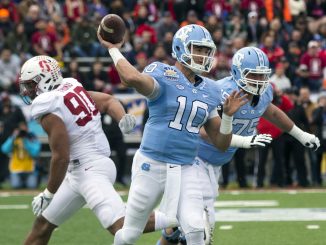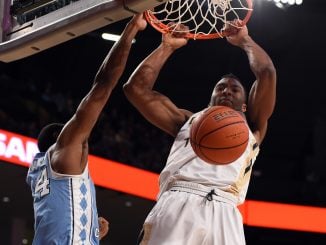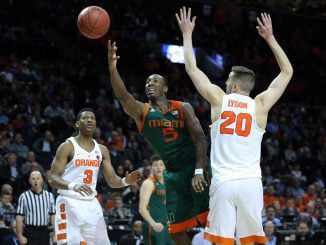In 31 years at Duke, Dan Brooks has won more national championships than any other coach in the history of the university.Hired in 1984 as the third head coach in Duke women’s golf history, Brooks has won six NCAA titles, 18 ACC crowns and an NCAA-record 122 team victories.When Brooks led the Blue Devils to the 1999 national title, the women’s golf team became the first female program to win an NCAA championship at the school.Brooks added NCAA titles in 2002, 2005, 2006, 2007 and 2014. He’s been named national coach of the year six times and ACC coach of the year 14 times. Getting ready to enter his 32nd season at the helm of the golf team, Brooks added a new honor to his long resume: Hall of Famer.The North State Journal spoke to Coach Brooks as he was about to enter the Duke Athletics Hall of Fame in early September.NSJ: You went to school in Oregon. What brought you across the country to Duke?Dan Brooks: I grew up in Oregon and left God’s country to come to Duke. It was an adventure. I didn’t know what I wanted to do. I knew I wanted to teach something. I went into golf and started to teach people and just liked that feeling. So I came out here for the interview and met a guy named (former athletic director) Tom Butters. I remember riding in the car with him during the interview I said, ‘Mr. Butters, if you give me this job, I’ll give it everything I’ve got.’ That seemed to matter to him. The next day, he said, ‘You’re everything we don’t want. You’re young. You’re single. You live on the other side of the country. But I like you. You’ve got the job if you want it.’NSJ: You’ve surely had other offers over the last three decades. Why did you stay at Duke?DB: Tom Butters kind of won me over during the interview, with the things that he talked about. Part of it was his presence, but it was also the mission, the message he had. I come from a family that I think is pretty high character. Education means a lot. Integrity means a lot. So when I started to marry two parts of me, one of them was that I wanted to teach. I liked the idea of teaching, and I’d just discovered that I liked teaching golf. And I married that with a university that stands for important things. It sort of became a great combination. And then when you’ve got somebody like Tom Butters who’s pushing that mission, and we’re getting better. We’re growing, and the department’s getting better. We’re adding some teams and things like that. You want to stay here because you want to be a part of that. Then Joe (Alleva, former Duke A.D. after Butters) did a little more and Kevin (White, Duke’s current A.D.) has come in and done a lot more. Everything keeps getting better. Our mission is still intact. And for all those reasons why would you leave? I used to say, ‘If I’m going to stay in this business, then I’m going to stay here, because why on earth would you leave.’NSJ: What was Tom Butters’ message that had such an impact on you?DB: Tom just had a way of getting people to want to work hard. I truly believe that for an entity to move to the next place, you can’t keep doing things the same way. You’ve got to have people that work beyond their pay grade, that go beyond their job description, that have a passion, a mission. (Butters) had a whole staff that did that. When I started in 1984, there were 64 employees in the Duke athletic department. We were operating on a shoe string. I remember one time, (men’s) coach Rod Myers and I were moving out of the old golf clubhouse, into a temporary thing, so they could build a hotel over there by the course. We couldn’t lock the trailers we were in. So I said, ‘No problem, Rod,’ and I spent two nights in a sleeping bag, with a baseball bat next to me, because we didn’t want to pay the cop to guard our trailers.NSJ: Has the induction into the Duke Hall of Fame caused you to look back on the last 32 years?DB: It has. I’ve just been reminiscing about people. It made me go back a little further. I’ll usually look at recent years, but I really started going back and thinking about some of the teams we’ve had. It’s not that many players, really, because I’ve had a small team. So each of them becomes, I think, a little bit more significant.NSJ: How do you keep the excitement level as high as it was in your first years at Duke?DB: Each year is unique. That’s the great point. You get a whole new group. When somebody graduates, somebody new comes in. And when you have a small team, it’s incredible how the team changes. It becomes a different deal. So now you’re excited again. Every season has its parts. You have your offseason, your on-season. There’s a lot of variety to it, and every one of those parts is going to change every year.NSJ: Does making the Hall of Fame change your outlook or approach going into next season?DB: It won’t change it. I’m excited to be going into the Hall of Fame, but it’s not like I’ve reached some pinnacle, where now I’m not going to have anything to motivate me anymore. It was never that. This is a really incredible honor, but it certainly was never any kind of goal.
Related Articles

Sports
UNC stands to benefit if Trubisky picked No. 1
Although it’s not as certain as it seemed earlier in the day, there’s still a chance that North Carolina quarterback Mitch Trubisky will be the first player selected in the NFL draft tonight. The benefits […]

Sports
Georgia Tech stuns UNC in ACC hoop opener
ATLANTA — After freshman Josh Okogie scored only five points in a near loss to North Carolina A&T in Georgia Tech’s previous game, Yellow Jackets coach Josh Pastner had a heart-to-heart talk with Okogie. The […]

Sports
Miami poses difficult first ACC tourney test for UNC
BROOKLYN, N.Y. — North Carolina didn’t have the luxury of hand-picking its opponent in the first round of the ACC tournament. Miami and Syracuse played for that distinction on Tuesday. If the Tar Heels had […]
